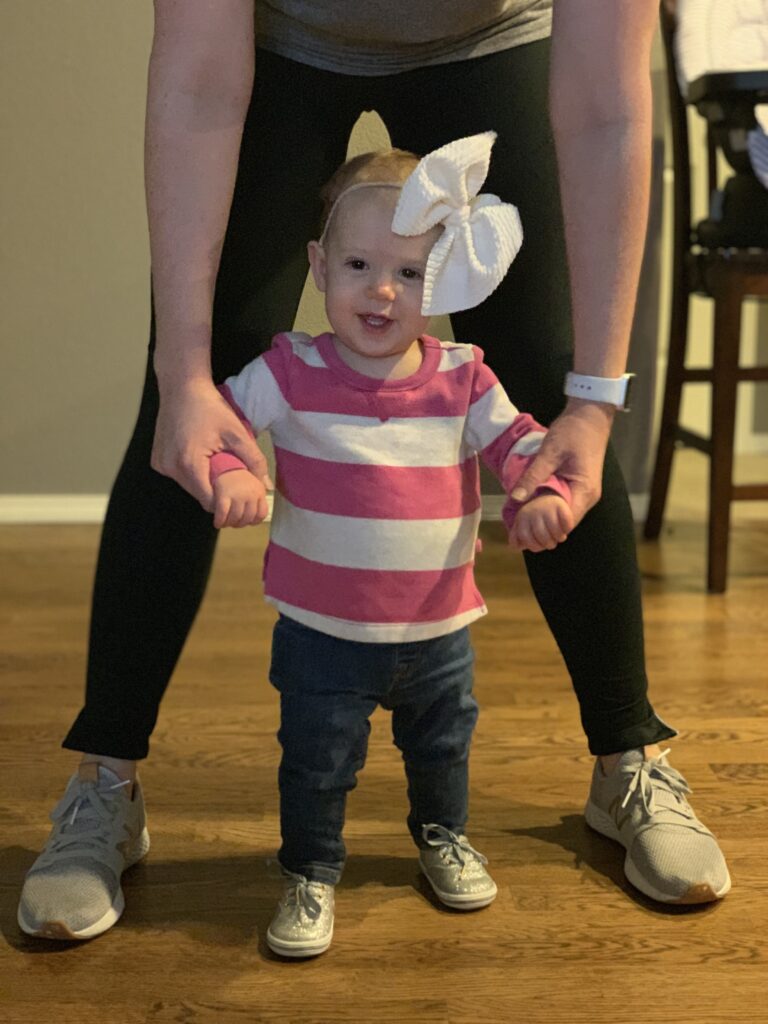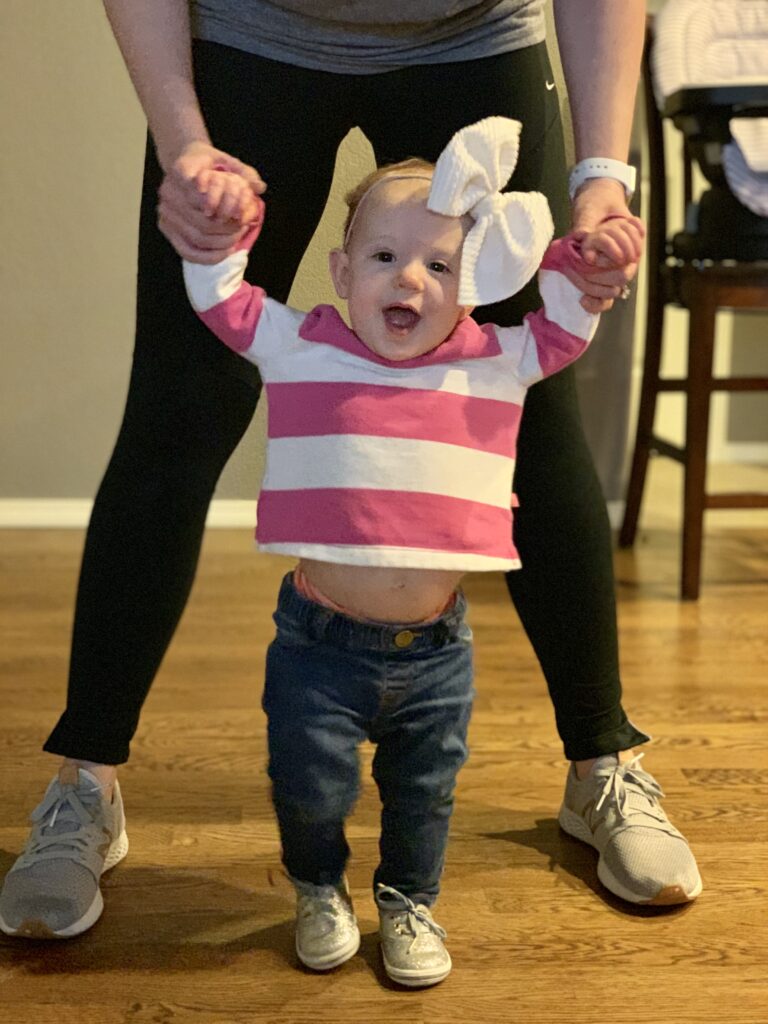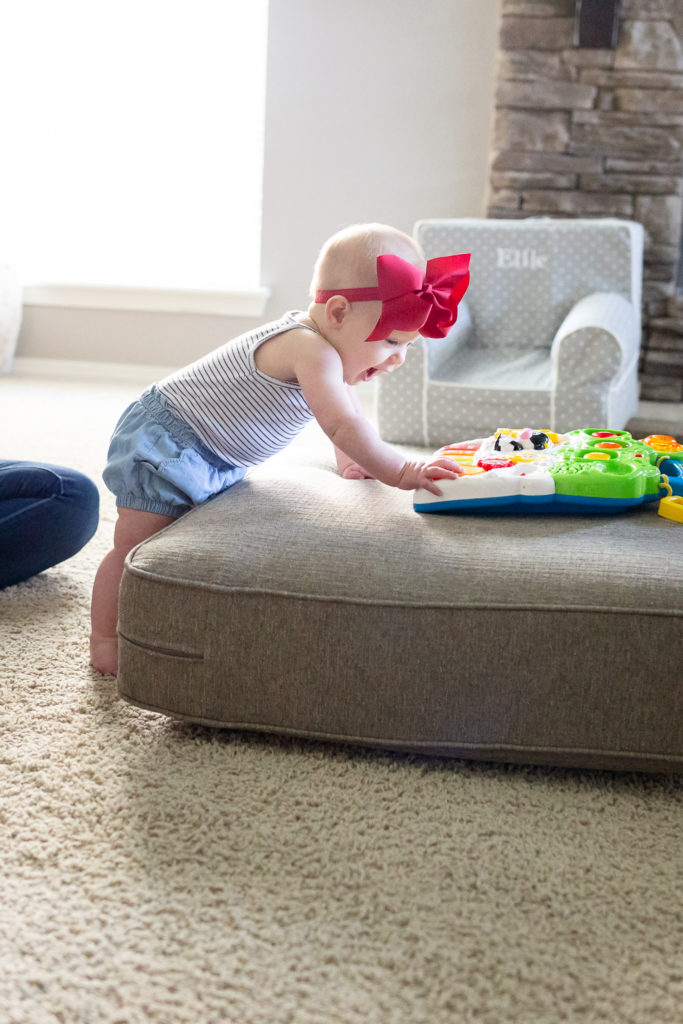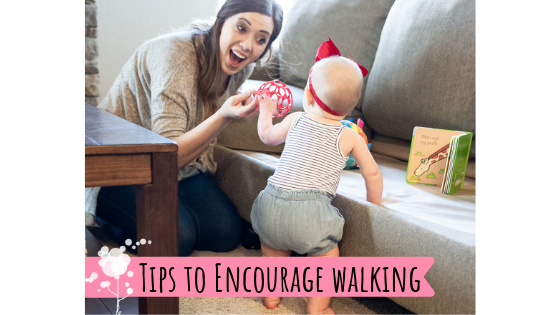I wish I had a dollar for every time someone asked me “is she walking yet?” when my daughter was a baby. I think the first time I heard this she was just around 8 months old! Do people really expect an 8-month old to be walking?! If so, they don’t know much about gross motor development!
First, I want to dispel the myth about “late walkers” because this is one of the most common questions I get asked by my Mommy & Me PT followers! The normal range of walking is 12-15 months (and even up to 16/17 months is normal if no other risk factors are present). Many people think if a baby isn’t walking on or before his birthday, then he is somehow delayed. But, I want to say this loud enough for the people in the back: WALKING IS NOT A RACE! If your baby isn’t walking by his first birthday, it does not at all mean that he is behind or delayed! I promise no one is ever going to ask in a job interview “at what age did you start walking?!” The fact is that if your baby starts walking at 11 months or if your baby starts walking at 16 months, there is no significant difference in development in later years (as long as no other risk factors or diagnoses are present). My daughter didn’t start walking until 13.5 months and she is just as smart and typical as her friends that started walking before their first birthday!
As a mom, I know how exciting it is when your baby takes those first cute steps and you are probably anxious for this milestone to occur, so I have come up with some helpful tips that you can use to practice this skill with your baby.
Give Opportunity
Unlike most gross motor skills, it is very hard to work on walking before your baby is developmentally ready. But, that doesn’t mean that you still can’t give your baby the opportunity to walk, even before he is completely ready. Around 11 months, I started giving my daughter the opportunity to walk by putting her in standing every time I put her down on the floor. After a diaper change, after each meal, after bath time, etc, I would put her on the floor in standing and let that be an opportunity for her to take a few steps. For several months, she would sit down almost as soon as I stood her up, but she at least had an opportunity several times/day. Eventually, she started standing for longer periods of time and then would take one or two steps here and there!
Give Something to Hold Onto
As parents, we feel like we need to “help” or “encourage” our babies to walk, and it certainly doesn’t hurt. We have all played the game ‘walk back and forth between mommy and daddy’ when helping our babies learn to walk. This is actually a great practice with a few considerations like make sure the space between the two destinations is not too far. Another great tip is to give your baby something to hold on to! Use a lightweight toy that your baby loves – one in each hand is even better – to give her a sense of stability as she practices walking. An alternative to this technique is to hold up a motivating toy or object as your baby walks to you. Make sure you hold the toy at the baby’s eye level! Holding it too low will cause your baby to want to sit down, holding it too high will cause the baby to look up and possibly fall backward.
Hold Baby’s Hand
When you think of helping a baby learn to walk, what is the first thing you think of? Holding your baby’s hands over her head to help her take steps forward? That is a very common way for parents and caregivers to assist their baby when walking, but would it surprise you to know that’s not really the best practice? When you hold your baby’s arms over her head, she is using her arm strength to hold herself upright and using momentum to swing her legs forward. A better way to assist your baby in walking with hands held is to hold your baby’s arms at or below shoulder height. This will encourage your baby to use her core to hold herself up and to use her core/legs to balance and take steps! An even more advanced way to hold onto your baby is to just hold her at the shoulders or the back of her shirt and leave her arms completely free. Your baby will need pretty good balance and need to be already taking a few steps on her own before she will be ready for this more advanced option, but it is nice to have multiple ways to help your baby!


Keep Toys up High
Earlier I mentioned giving lots of opportunities to stand, and this is another super practical way to do that! An easy way to give the opportunity to stand is to put toys and motivational items up high on a coffee table or couch. Being comfortable in standing is an important precursor to beginning to walk. When everything that you enjoy is down on the floor, what motivation do you have to stand up? When your baby is standing up playing with toys, the natural progression will be to start taking steps along with furniture (cruising), starting to spontaneously let go of support to stand independently, and eventually start to take a few independent steps between furniture. This is not to say your baby should never spend time on the floor, just try to make it a point to encourage standing several times a day!

Follow Your Baby’s Lead
This last tip is probably the most important, but also likely the hardest to follow: follow your baby’s lead when it comes to walking! The time when YOU are ready to work on walking and when your baby is ready to work on walking might not be the same! If you try to work on walking with your baby and she is resisting by squirming, holding her legs up, crying, or protesting, these might all be signs that your baby is not ready to work on walking! If you find yourself in this struggle match, the best thing to do is to wait a few days and then try again. You can continue giving opportunities, but if you are met with resistance, then it will not do you or your baby any good to try to force the issue. Every baby is different and follows a different gross motor timeline! If your baby is 12 months and will not put any weight on her legs or is 18 months and is not yet taking independent steps, I would suggest asking your pediatrician for a Physical Therapy referral just to rule out any issues that might be hindering these skills! Otherwise, just follow your baby’s lead and celebrate every tiny milestone that your baby makes!

Be the first to comment